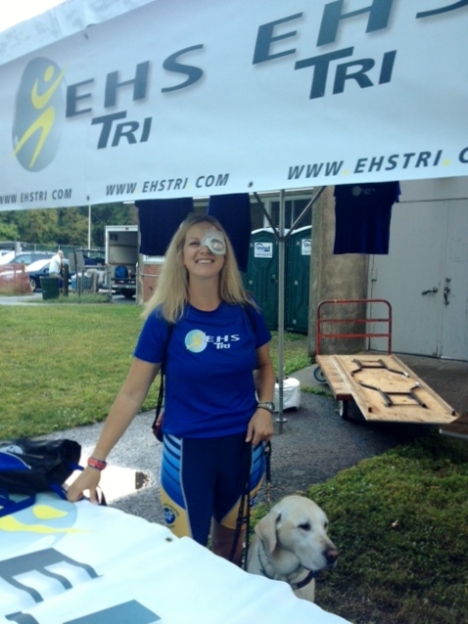I was dropped from a 3 story building and landed face first on the cold, hard concrete below. From what I could tell, my eye had taken the shape of the flat sidewalk it was imbedded in, and now resembled a Hershey’s kiss in structural integrity. My neck wouldn’t work to lift my eye off of the surface to try to relieve the pressure. Honestly, even if I could move my neck, I was afraid to, as perhaps my eye would stay stuck to the stone, and would be pulled from the socket that was now so badly damaged. My full body weight seemed to rest on the left eye, which seemed impossible, but all my appendages were numb, and somehow the eye was the only thing I could feel. I could hear sirens and people milling about, but was unable to speak but a whisper to my guide dog Elvis, who laid with his head next to mine on the pavement, patiently waiting for me to move.
With a start, I woke up, sweating, my hand on Elvis’ muscled hindquarters, confused by my surroundings. This was a room, not the street I anticipated waking to. This was MY room. I fumbled for the light, breathless, desperate, while holding my palm against the offending eye. How could this happen? Why were they torturing me this way? With one eye covered, I attempted putting on my reading glasses, located on the nightstand beside me. Fitting them over my face while one hand covered my bad eye proved challenging. Opening my medicine closet, I searched through the colored bins of medications for the one in Red labeled simply, “Pain”.
Tylenol, Aleve, Ibuprofen, Ketorolac, Sumatriptan; nothing that would tackle this ‘face to concrete’ agony I was now facing. I just prayed for it to end, in any way possible. I couldn’t breathe. I remembered the Fiorcet for my migraines, and dug furiously for that, trying to remember the generic name so I would recognize the bottle by shape, and perhaps make out a letter or two of the actual label. I also stumbled upon a jar of cough syrup with Codeine. THAT would be the choice to knock me out with until I could call and scream at the doctor in the morning.
Sadly, this wasn’t the first time I had been sent home from an invasive eye procedure without proper pain management. The eye is one of the most sensitive organs in our bodies. I have broken ribs, ankles, elbows, fingers and wrists; had surgery on my knees and shoulders, crushing hip pain due to inflamed trochanters post chemotherapy. But nothing, no nothing, compared to that visceral, primal feeling of post surgical and injection eye pain. The kind of pain that makes you nauseous thinking about what had just been done to your eye.
I’m not a shy person. I’m generally pretty good about speaking up for myself and for others who need a voice. But every time I get into that Ophthalmic exam chair, I turn into a meek, seemingly helpless and intimidated patient. Having world class surgeons whisking in and out, talking about you as though you’re not in the room, and making life-altering decisions for you is part of my weekly, almost daily existence. Because I have extensive knowledge of my disease, I speak up and ask questions sparingly, and take a great deal of time to be sure I’m as articulate and concise as possible when taking up the surgeon’s time. Making a case for myself regarding the amount of pain I suffer with on a weekly basis has been my downfall.
There is the distinct reality that people in chronic pain can easily become addicted to pain medication. Having family members who have lost their lives to such addiction, I make sure to be cognisant of it each time I reach for narcotic pain meds. Having a healthy respect for these powerful drugs and the euphoria they can induce keeps me vigilant regarding their time and place. Fortunately (or unfortunately I suppose) I have a built-in ‘governor’ that prevents me from taking too much or too often. One, I suffer from Irritable Bowel Disease, which most narcotics directly aggravate. Two, I suffer from migraines, and narcotic pain meds are known for causing ‘rebound’ migraines as you come off of them. And three, I have an allergic sensitivity to these meds, causing me to itch uncontrollably. So, abusing these medications is most certainly NOT in my future, unless the idea of being constipated with a migraine while itching my skin off appeals to me, which it does not.
I don’t know why Ophthalmologists choose to be incredibly guarded when dispensing these pain meds. My eye on most days feels like someone is grabbing it by a long cord attached to the back of it, and attempting to pull it back into my brain, through an eye socket that is simply too small to allow it to fit. The doctors dismiss this as ‘dry eye’. Apparently Uveitis patients lack the ability to produce tears that keep the eye lubricated, and the eye sort of ‘shrinks up’ and crackles like dry, flaky skin that we all experience in the winter. The eye, however, is a hell of a lot more sensitive than your skin. Drops last mere minutes, and even the lubricating gel and ointment is quickly washed away by the efficiency of our eyelids.
I often talk about the ‘frying pan to the head’ feeling I get from certain migraines and when the eye is aggravated. I feel as though if ONLY someone would take my skull and ‘re-shape’ it back to round, from that flat-head feeling of being bonked with a cast iron skillet, I would feel ever-so-much better. The ice-pick pain that shoots at random through my left temple and directly through the center of my eye is honestly the most terrifying of them all and shocking, as it comes on so suddenly, and can disappear just as quickly. It is like a flash of lightning, with powerful, direct contact to its intended target, then immediately gone. You become dazed and disoriented like you’d just been struck, and cower in fear that it could return again at any moment. Telling yourself that ‘it’s temporary’ is of little to no comfort.
Having stitches in one’s eye leads to unique pain as well. Not only do the strong, nylon stitches do an excellent job of shredding the interior of one’s eyelid as it scrapes the lid with every eye movement, the feeling as the body heals is truly unsettling and unique. Just like your skin, the area surrounding the stitch begins to ‘tighten up’ and pucker as it scars into healing. That shrinking of the tissues leads to a pulling on the tension of the stitches, and trust me, you can feel it with each and every turn of your head and eyes. This constant pulling starts to feel like ripping as the body continues to heal, and I find myself rushing frequently back to the doctor begging him to take out the stitches well before it’s time.
Ater 13 surgeries, one would safely assume I’d gotten used to the different variations and manifestations of eye pain. Alas, acclimating to something that is a little different every time is a lesson in futility. I’ve tried meditation, which is a wonderful distraction, but doesn’t solve the base problem, biofeedback, which I think is a total waste of time and money, aromatherapy, which while pleasant, is not a cure, and any variety of body positions to lessen the severity and intensity of the bouts of pain. I wish there was an easy answer. Narcotic pain meds are an important part of the recovery process for anyone postop. They allow the body to heal without one’s brain sending constant distress signals throughout. They allow you to breathe when awake without that pained hitching breathe one does when in terrible pain. And most importantly, they allow the body much-needed rest to heal and adapt to its new reality, whether that’s learning to walk with one leg, or seeing with one eye.
Proper pain management is as much mental as it is medical. Having been sent home Monday after an injection of gel into my eye to ‘re-inflate’ it, I assumed I would be ok to take the train with my guide dog the 90 minute trip back home. I even asked prior to the injection how I would feel after, and they assured me that I would have no discomfort, and dismissed my inquiry so abruptly that I felt foolish for even asking. I was assured so well in fact, that I made plans to grab a burger after the procedure down the street, as I hadn’t eaten in nearly 8 hours, and a friend sweetly stopped by to keep me company at my appointment. After dining, I hopped a shuttle bus to the train, at which point I began to notice some tearing in the injected eye, and dabbed gently with a tissue.
By the time my train arrived at the station, nearly 50 minutes later, the eye was draining extensively, and the ladies in the Amtrak station were rushing to my aid with boxes of tissues. I kept my dark sunglasses on and made my way to the train, determined to close my eyes, set an alarm for 5 minutes before my anticipated stop, and rest. Like the sun shining on a refugee who had been underground for months on end in the dark, I crawled into the fetal position on the train, holding the soaked tissues against my eye. The pain then started- at first like sand had blown into my raw, exposed eye, then progressing to feelings of tiny glass shards every time I dared to blink. I felt like my eyelids had thousands of razorblades lining the inside, tearing the surface of my cornea to shreds of tissue with each and every blink.
I desperately reached out to the on-call physician at Yale, who got back to me fairly quickly. He asked me to lubricate the eye with drops of gel and to take tylenol. In my head, I was telling him to go fuck himself. Out loud, however, I thanked him and hung up. I started to get hysterical as the pain increased, texting anyone I knew to pick me up when my train would arrive at home, so I could get home to find SOME sort of relief buried in my medicine cabinet. A friend who is a physician responded, calling me right away, and talking me down from my ledge. She and I cursed the Yale doctor out together, promising to strangle him at my next appointment. We then went through a list of what I had at home that could do in a pinch, as neither she or my regular doctors could prescribe appropriate pain meds over the phone to my pharmacy.
Cough syrup with Codeine in it would allow me to sleep, and tylenol would have to suffice. A friend whisked me home where I marched straight to the medicine closet, coat and hat and boots still on, where I wiped away tears in the hopes that I could attempt to read the labels before me.
I don’t want your sympathies, but I do want your understanding with this post. No one should have to suffer in debilitating pain longer than a few minutes. There is a reason there are great pharma companies and homeopathic remedies out there to alleviate pain. I want doctors to take a beat to realize what is truly going on with their patients when they leave their offices AFTER the local anesthetic wears off, which it inevitably does. If doctors are concerned about drug-seeking patients, they need to understand that prescribing even a 48 hour dose is a life-saver for someone in that kind of post-surgical or procedural pain. Beyond that, yes, I believe tylenol and other NSAIDs can do an incredible job of pain management and relief in healing. NO ONE should have to wake up face-down on the concrete.




I agree about Ophthalmologists and pain meds! My last strabismus surgery (which was otherwise fine and done by a dr. I trust and respect) I was sent home only with extra-strength Tylenol… definitely not enough for that pain. I need to have it re-done sometime soon, and I’m dreading it (but will also know to request more meds!)
I’m so horrified by this I can barely write. It will not be enough to scream at your doctors, who obviously are insensitive to this. What are you plans going forward — how do you intend to get this in hand — your doctor friend? Is there a pain clinic near you that your insurance will cover? For me, I am not worried about addiction; I am worried about pain, which destroys people’s lives.
Amy, I am so sorry to hear this. As someone who understands the loss of sight, I have to wonder if all you are going through is worth it? It also makes me very sad for my daughter, Beth who, as you know now has Uveitis in both eyes. It has progressed to severely inflamed retinas. As much as I’d like to have her sight saved, I would sincerely hate to have her go through what you describe.
Amy… gosh, I hate thinking about this. Your description of the pain that comes from eye surgery really hits home for me. I, too, was denied anything to help and I was told that no one ever complains about pain. I was made to feel like either a hypochondriac or a baby. Thank you for speaking out about it. I hope you feel better and see better soon. Lots of love and support!
I’m so sorry, my heart goes out to you. A good friend of mine just found out her poor vision will only progress and worsen so I have been on the internet seeking forums and blogs about how other people cope. Just trying to see what I can do to help her. I came across your blog and feel horrible you have had 13 surgeries! If you don’t mind me asking, what is your diagnosis? And why all the surgeries? I’m so worried for my friend now.
As far as pain meds go, I was reading some other topics you have shared and they did prescribe Percocet at one point. Did you change doctors? The hard fact is the doctors are not giving it to you because they want the procedure to be successful and those hard drugs you are referring to can ruin what they were trying to fix. These drugs like Percocet, vicodin, etc can cause swelling of the eye and eyelids and they are already inflamed due to the procedure/ surgery you had. They can also affect circulation in the eye. Then the issue of it causing dizziness, confusion, lightheaded, etc which is not safe. You could fall and really hurt yourself. They don’t want any of that to happen to you. So they are extra cautious, plus you have a sensitivity to the meds which is severe itching and can lead to other allergic reactions which is so dangerous. It’s horrible because they are actually helping you heal and be safe but you have to deal with the pain. Hopefully each day the pain lessons.
Thank you so much for sharing.
Thank you. I have Multi focal Choroiditis with PanUveitis and AZOOR and Glaucoma. The surgeries are to implant steroids into the eye to control inflammation. The more recent surgeries are because of uncontrollable Glaucoma- high intra ocular pressure. That is an ongoing issue and more surgery is immiment
Wow! That is a lot! Is it common to have multiple eye diseases? Or is your conditions atypical? I know someone who has bad glaucoma but I don’t think anything else. I have another friend who is legally blind but has contacts and functions pretty well. Obviously not like someone with good vision but you would never know he was legally blind until he mentions it. If he doesn’t have his contacts he can’t see anything. Sorry for all the questions, I’m just very interested in how one person can have one eye problem, another two then another even more. I don’t know anyone with two but I’m just assuming. You have so many and I’m sorry to hear that. Just curious if that is common or unfortunately rare? You have an awesome attitude. It’s very refreshing to see all your accomplishments. Totally awesome, Amy!!! 🙂
Amy, I have to say I am exhausted after reading this. But more importantly, I am re-energized in my desire to raise as much funds as possible for Guiding Eyes, the one place that I know myself, and countless Lions, can help support, so that they can help support you with the likes of Elvis to make your life more manageable in some ways. I’ll offer a special prayer up today for you and all who are challenged like you. My heartfelt best wishes go out to you. I will share this post with many friends so that they may understand what the daily challenges are and why they need to work so hard to support the good organizations that support the people who need them. God Bless.
I can relate to this post on so many levels and I think the first order of business regarding ophthalmologists is patient-centric training. Are they good at what they do? I suppose however they really need to work on their communications and empathy skills. I’m now legally blind after bouts of macular holes which I never even heard of till the first one appeared out of the blue 8 years ago.
Eye pain is the worst and when it happened to me after my first vitrectomy I thought I was going to lose my mind. So I called the on-call ophthalmologist, got an emergency appt. and since the eye was already red, inflamed and felt like it someone was injecting a hot poker in it he of course has to examine it by shining that bright light which only intensified my discomfort. He did prescribe pain medication I think it was Vicodin and I had to use Cyclogil (which oddly enough hurts when you put it in the eye but after a few minutes it does bring me a little relief).
While most of my eye pain was experienced after my surgeries and I now have Iritis, it’s nothing in comparison to yours and I feel awful that you have to endure this unimaginable discomfort. Please know I’ll send up prayers for you.